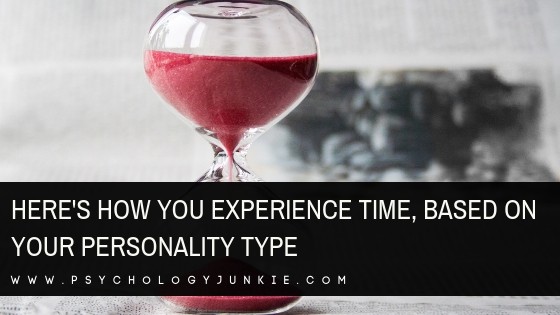Here’s How You Experience Time, Based On Your Personality Type
Did you know that each personality type experiences time in a slightly different way? Some types are more likely to revisit the past while others are more likely to stay tuned into the present or future. Knowing how each individual experiences and manages time can help you to avoid conflicts. Many times fights and arguments erupt because two people are using time in a different way or focusing on a different place in time. Read along to find out more!
Not sure what your personality type is? Take our new personality questionnaire here. Or you can take the official MBTI® here.

Table of contents
Estimated reading time: 16 minutes
ENFPs, ENTPs and Time
ENFPs and ENTPs use a mental process called Extraverted Intuition, or “Ne” for short. Extraverted intuitives have a very broad time focus. They are often stimulated by what’s happening in the present, but instead of thinking of immediate experiences and details they think of future potential. For example, they might see a forest and think “What would happen if the forest didn’t exist?” or “What if I built a theme park full of treehouses that are all connected?” ENPs look for connections in the past and future to generate possibilities and new innovations.
As perceiving types, ENFPs and ENTPs tend to be adaptable about time. They like to stay open to new changes, possibilities, and creative insights. They don’t like to hurry up with a project and get it done quickly; they are more stimulated by the creative process than they are with closure and completion. Distractions, side-trails, and interruptions aren’t as disruptive to them as they are to judging types.
As feeling types, ENFPs prefer to spend their time finding their purpose, meaning, or significance. Many ENFPs enjoy spending time on personal growth or understanding their own psychology or the psychological makeup of other people. Impersonal tasks and routine procedures are usually dull to them and they can find themselves looking for more meaningful distractions. This is why ENFPs are best suited for jobs that coincide with their personal values. They can be highly motivated, productive, and goal-oriented if they believe in what they’re doing on a personal level.
As thinking types, ENTPs see their time as part of a bigger system. They view it as a tool to accomplish things and they see it as less personal than the ENFP does. They look at how they can improve or re-work systems, how they can understand a concept more fully, or how they can innovate and bring about progress in the world. They can be interested in personal growth, but they can also be motivated about a project simply because they are curious about the experimentation itself. For the ENTP, the goal doesn’t need to align with a personal value for them. They are more motivated when they can experiment, innovate, and change things up to see what happens.
Read This Next: 3 Weird and Wonderful Secrets About the ENFP or 10 Surprising Truths About ENTPs.
INFPs, INTPs and Time
INFPs and INTPs also use Extraverted Intuition (“Ne”). This means that they also have a broad time focus. They experience something in the present and generate future possibilities as well as past connections. They tend to “jump around” in time from present to past to future or in the opposite direction.
Unlike ENPs, INPs focus less on gathering outer-world information than they do on the inner world of analysis. They can appear very open-minded and adaptable to other people, but inside they often have a firm set of values or principles that they judge everything by. They tend to be more reflective and inwardly-decisive than ENP types tend to be. They filter all the possibilities they generate through a lens of “does this align with my values or challenge them?” (INFP), or “does this fit with my logical framework or challenge it?” (INTP).
INPs also have tertiary Introverted Sensing (Si). This means that they’ll have a fondness for nostalgia in their own personal lives. They often have favorite memories they like to revisit or childhood pastimes they enjoy repeating. However, they can jump from reminiscing about the past to leaping forward into distant-future ideas in an instant.
As perceiving types, INFPs and INTPs tend to be adaptable and flexible with time. The process of analysis and idea-generation is usually more interesting to them than having closure or completion on a project. If something is especially interesting or meaningful, they don’t mind being interrupted or delaying a project they are currently working on. In fact, they are often excited by this prospect!
As feeling types, INFPs prefer to spend their time finding their purpose, meaning, or significance. They are often drawn to writing, psychology, or personal growth. Impersonal tasks and routine procedures are usually dull to them and they can find themselves looking for more meaningful distractions. This is why INFPs are best suited for jobs that coincide with their personal values. They can be highly motivated and productive if they believe that what they are doing is meaningful on a personal level.
As thinking types, INTPs see their time as part of a bigger system. They look at how they can improve or re-work systems, how they can understand a concept more deeply, or how they can innovate and bring about progress in the world. While personal growth may be a focus of theirs, they tend to be curious for curiosity’s sake. They want to experiment with causes and effects and find accuracy and truth more than subjective meaning or emotional depth. For the INTP, the goal doesn’t need to align with a personal value for them. They are more motivated when they can experiment, innovate, and find new logical truths.
Read this next: Here’s Why INFPs and INTPs Get Misunderstood
INFJs, INTJs and Time
INFJs and INTJs use a mental process called Introverted Intuition, or “Ni” for short. This process gives them an intense focus on the distant future. INJs are nearly always focusing on broad, long-term effects and implications. Even in school when they write essays, many of their essays are projected into far-distant future realities. They make abstract leaps in time to envision how patterns and events will play out in 20-50-100 years or more. Sometimes they run the risk of spending so much time in the future that they lose track of what’s happening in the present moment.
Although INJs are categorized as judging types by the Myers-Briggs system, they actually tend to have a lot in common with perceiving types. This is because their dominant mental process is a perceiving function (intuition) rather than a judging function (thinking or feeling). In their outer world, they enjoy having closure and order. If they are in a situation where nobody can make a decision, they tend to feel a responsibility to decide and move forward. They tend to appear more decisive, structured and organized about time than they really feel. On the inside, they are actually less eager to come to closure on an idea and enjoy toying with many different perspectives and angles. Their inner world can handle a bit of chaos but they like their outer world more organized and focused. INTJs and INFJs both tend to be “work first, play later” types.
As feeling types, INFJs will tailor their time around the needs of people. They might spend three hours listening to someone’s troubles and interpersonal issues and not feel bad about it even if it means they have to cram to complete a project later. They are sensitive to other people and their time and believe that time is useful for finding their purpose, significance, and meaning. They tend to prioritize personal growth and will spend a lot of time figuring out their psychology or the psychology of other individuals. They can procrastinate about situations that require them to give criticism or handle conflict.
As thinking types, INTJs see time as conceptual and impersonal. They view it as a tool with which they can accomplish goals or reach a logical understanding of how the world works. They usually organize their time based on priorities and will be more frustrated if personal demands get in the way of their goals or visions. They tend to prioritize information-gathering and achievement and enjoy having a lot of time alone to contemplate and reflect. They can procrastinate about working on their relationships or inter-personal issues.
Read This Next: Here’s Why INFJs and INTJs Seem “Intense”

ENFJs, ENTJs and Time
ENFJs and ENTJs view time as a resource to be used. Because these two types use Introverted Intuition (“Ni”) as an auxiliary mental process they tend to focus on the distant future a great deal. However, as extraverts, they are more action-oriented about their time than INJ types tend to be. They think about how they can “use up” time, put it to its best possible use, and how they can arrange it to influence the future.
As judging types, ENJs like having an established schedule and they usually keep an eye on how much “free time” or “work time” they have. They like having closure, making decisions, and leaving things settled. Ambiguity can be difficult for them to live with – they want to know where they stand and how much time they need to complete a project or reach a goal. ENJs will have their eye on the clock more than perceiving types, or even IJ types, will. They tend to have to-do lists and they also desire control over their schedule. They are “work first, play later” types and they can procrastinate about making time for play or leisure.
As feeling types, ENFJs believe that time is to be used in service of personal or inter-personal goals. They tend to arrange their time around the needs and requirements of people. They can spend a great deal of time listening to someone’s struggles and not feel bad about it, even if it means they have to rush to get some of their other tasks done on time. They give people and personal needs the highest priority and are very sensitive to other people and their time. They believe time should be spent in finding life’s purpose or helping other people to find theirs. They tend to feel guilty saying no to the needs of other people and can neglect their own priorities.
As thinking types, ENTJs believe that time is impersonal and should be used as a way to reach goals and effect change. They are usually extremely productive with time and time-conscious. They hate “wasting” time although they may have spurts of “playing hard” after they’ve worked for a considerably long period. They see time as conceptual and also a tool. They may become so focused on achievement and goal-accomplishment that they bypass the needs of people or even their own physical needs in pursuit of their vision. ENTJs are one of the most time-conscious personality types.
Read this next: 10 Things You’ll Relate to if You’re an ENFJ or 10 Things You’ll Relate to if You’re an ENTJ
ISFPs, ISTPs and Time
ISFPs and ISTPs are flexible and open-minded about how they use time. These two personality types use a mental process called Extraverted Sensing (Se). Because they use this process they are extremely attentive to what is happening in the present moment. Sensing-Perceiving (SP) personality types stay tuned into what’s happening “right now” and are usually the types that act the fastest in crisis situations. They are good at on-the-spot troubleshooting and improvising.
As perceiving types, ISFPs and ISTPs are flexible and adaptable. They attempt to make the best use of each moment they are in and don’t usually mind a scheduled change. They are good at seeing and meeting immediate needs and noticing current details that other types often miss. They like to stay open to change, new opportunities, and experiences. They can struggle with procrastination, especially when they have particularly repetitive or laborious tasks in front of them.
As feeling types, ISFPs are sensitive to people and their time. They believe time should be spent in search of their passion, their dream, or their purpose. They believe time is best spent in the service of their ideals or in the service of the people they care about. This is why many ISFPs have a creative side! They enjoy expressing their values and passions through art, song, drama, and any other creative avenue. Many ISFPs also find themselves over-represented in nursing and emergency care services where they can use their on-the-spot thinking to help others.
As thinking types, ISTPs arrange their time based on the events of the day and what needs to be done. After their duties are dealt with they enjoy being alone to engage in action or analysis. Time spent in solitary recreation is often preferred over time spent socializing. Time spent reading books, playing video games, or relaxing at home is often enjoyed. If they have a particular goal personally they can be quite determined and hard-working to achieve it. If they don’t have a goal in mind they tend to enjoy recreation and quiet, relaxing activities that allow them to use both their dominant thinking and auxiliary sensing functions.
ESFPs, ESTPs and Time
ESFPs and ESTPs view time as a resource to be used in the fullest possible way. As dominant Extraverted Sensing (Se) personality types, they are extremely tuned into the present moment. They don’t believe in spending a lot of time reminiscing about the past or hypothesizing about the future. They want to experience all that can be experienced right now. They are intensely observant of all that’s happening around them and they seem to have a radar for opportunities, experiences, and enjoyments that could make each moment more exciting. They want to live life to the fullest and they have a strong sense of adventure.
As perceiving types, ESFPs and ESTPs are flexible and adaptable with time. They like being able to switch gears, change plans, or take in new information and opportunities. They tend to be good at multi-tasking and they enjoy mixing work with play. They can struggle with procrastination and completing tasks they find boring or repetitive.
As feeling types, ESFPs believe that time is relative and that they should arrange it based on the needs of their loved ones or their own values. They enjoy areas of personal growth, finding hands-on ways to help people out, and they enjoy playing the role of “good samaritan”. They tend to excel in career fields where they have to think quickly and help people. This is probably why many ESFPs enjoy fast-paced humanitarian or people-centric career fields like being EMT workers, surgeons, or even working in the entertainment industry.
As thinking types, ESTPs objectify time and try to organize it based on the goals and tasks they have to accomplish. They are prone to starting more laborious tasks at the last minute and “cramming” to get them done on time. They can procrastinate about working on their relationships or dealing with inter-personal conflicts because those can make them feel out of their element. They are highly motivated in fields where they can combine both action and quick, logical thinking. They tend to perform well in emergency medical fields, the military, as entrepreneurs, and even as Hollywood stuntmen/women!
Read This Next: 10 Signs That You Might Be an Extraverted Sensor.
ISTJs, ISFJs and Time
ISFJs and ISTJs are usually good at time management and are able to throw out priorities that seem impractical or unrealistic. These types both use a mental process called Introverted Sensing (Si) to gather information. This function tends to compare and contrast past experiences with what is happening in the present moment. As a result, ISJs usually have a fine-tuned awareness of what has worked before and how it can be implemented again. They are also good at planning, particularly making contingency plans so that their future is secure.
As judging types, ISTJs and ISFJs like to have a plan and appreciate knowing what to expect. They enjoy having their days and weeks mapped out so that they can mentally fortify themselves for whatever might be happening. They can be rigid about schedules though and can find it hard to just “relax” and let life happen as it comes to them. As introverts, ISTJs and ISFJs can sometimes get wrapped up in their own projects and forget about what’s happening in the outside world. That said, because they take their responsibilities to their families and communities very seriously they can also run the risk of letting other people invade their time too much. This can result in them getting overwhelmed and drained.
As feeling types, ISFJs see their time as a resource to be used to help others. They believe that time is relative, that it needs to be organized around other people’s needs (a family member, friend, or even a work position). They are often drawn to career fields that involve practical service to communities. In fact, ISFJs are the most common personality type among elementary-school teachers! They believe in applying themselves in a hands-on way (sensing) to the needs and emotional concerns (feeling) of others. They can procrastinate about dealing with conflict situations or giving out criticism.
As thinking types, ISTJs objectify time. They organize time based on which tasks have the highest priority. They especially take their work and community responsibilities seriously and are unlikely to back down from a commitment unless something very serious has come up. They are usually good at prioritizing, organizing tasks, and creating an efficient schedule. They sometimes procrastinate about dealing with relationships or emotional issues.
Read this next: 10 Signs That You Might Be an Introverted Sensor
ESTJs, ESFJs and Time
ESTJs and ESFJs are both very organized and scheduled with their time. These are the people who usually jot down plans in a calendar or an organizer and have their weeks planned out in advance. They like to be prepared and they like lots of projects and activities to keep themselves busy. These two types use a process called Introverted Sensing (Si), an information-gathering function that helps them to hold onto past lessons they’ve learned so that they can implement those lessons in the present or future. They trust “tried-and-true” methods and wisdom that has stood the tests of time.
As judging types, ESTJs and ESFJs don’t like procrastinating or dealing with sudden, unexpected changes. They take their responsibilities and commitments very seriously and will rarely be wishy-washy about things they’ve said they will do. They never want to be caught at the last minute without a schedule or plan – this makes them feel incompetent or insecure. As extraverts, they feel the need to get others involved, and they often enjoy group activities and events. They can sometimes run the risk of being invasive with other people’s time.
As feeling types, ESFJs believe that time should be organized around the needs of people. They are very generous with their time and will often spend hours listening to other people and caring for them even if it means they have to “cram” to finish all their projects. They are usually gifted at organizing people, creating harmony, and boosting morale. They are good at noticing practical needs that need tending to and customizing a comfortable atmosphere for the particular people they are with. They seem to have a sixth-sense for what each individual will find comforting, soothing, or enjoyable.
As thinking types, ESTJs see time as a resource that needs to be utilized as efficiently as possible. They are extremely time-conscious and will prioritize their work responsibilities very well. They usually have to-do lists full of things that need to be done, and they’re usually good at delegating and getting people involved to achieve a goal. They are “work first, play later” people and can procrastinate about making time for leisure and play. Their time management skills, as well as their ability to think logically and effectively, plays a part in making them the highest earning Myers-Briggs® personality type.
Read this next: The Unique Intelligence of the ISFJ, ISTJ, ESFJ and ESTJ Personality Types
What Are Your Thoughts?
Do you have any thoughts or insights related to this article? Let us know in the comments!
Find out more about your personality type in our eBooks, Discovering You: Unlocking the Power of Personality Type, The INFJ – Understanding the Mystic, The INTJ – Understanding the Strategist, and The INFP – Understanding the Dreamer. You can also connect with me via Facebook, Instagram, or Twitter!











As an ENTP-A, i tend to focus short term like this week is only important but mentally compare to similar events in my past. This specially true about new men in my scheduled events.
Good points! I will say though as an ISFJ and Enneagram 9 I’m not that rigid about schedules
Yes! Enneagram can definitely impact how you experience these things and cause some differences 🙂 Thanks for your input – it’s helpful to remember the enneagram aspect!
Thank you for providing this valuable information, Susan. I always learn something interesting and informative from your writings.
I am always impressed how spot on you are! As an INTJ I often feel like I have a lot of “P” in me, and it seems like a weird dichotomy, and once again you nailed it! As a thank-you for your articles, I have referred you to my friends and family who are also M&B junkies. 🙂
Hi Gretchen! This is so great to hear! Thank you so much for your kind and encouraging feedback 🙂 Yes, the J/P difference can be very confusing for IJ types because we lead with a perceiving function (intuition or sensing) so we don’t fit a lot of the stereotypical “judger” descriptions 🙂
Thank you for this article, it all makes sense. My partner is an anomaly though – identifies strongly as ISTJ, but has shocking time management! He prefers to spend time looping between Si and Fi functions rather than engaging his auxiliary function, Te.
Hi Susan, your posts are so interesting and insightful! Looking forward to future articles and posts!
Thank you so much!! I really appreciate it 🙂
“If something is especially interesting or meaningful, they don’t mind being interrupted or delaying a project they are currently working on. In fact, they are often excited by this prospect!”
Yes! This is a main reason why time-blocking doesn’t work as a time-management tool for INTPs and similar temperaments. Even when I do try to map out a schedule for the day, something always pops up that is more interesting than the task at hand, and before I know it I’ve spent multiple “blocks” on a tangent. I may well accomplish something, but it’s not the “something” I’d planned to accomplish that day.